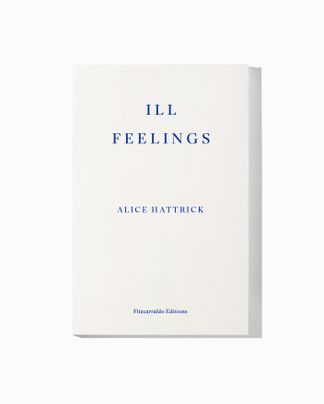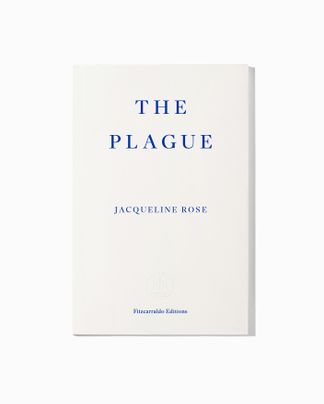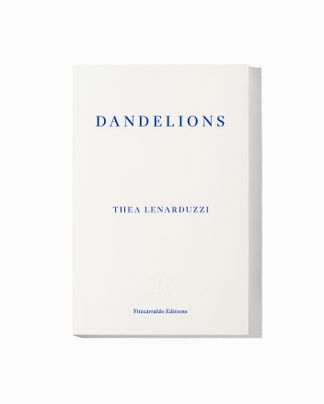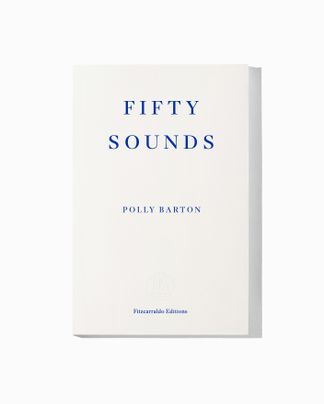What makes a good death? A good daughter? In 2009, with her forties and a harsh wave of austerity on the horizon, Marianne Brooker’s mother was diagnosed with primary progressive multiple sclerosis. She made a workshop of herself and her surroundings, combining creativity and activism in inventive ways. But over time, her ability to work, to move and to live without pain diminished drastically. Determined to die in her own home, on her own terms, she stopped eating and drinking in 2019. In Intervals, Brooker reckons with heartbreak, weaving her first and final memories with a study of doulas, living wills and the precarious economics of social, hospice and funeral care. Blending memoir, polemic and feminist philosophy, Brooker joins writers such as Anne Boyer, Maggie Nelson, Donald Winnicott and Lola Olufemi to raise essential questions about choice and interdependence and, ultimately, to imagine care otherwise.
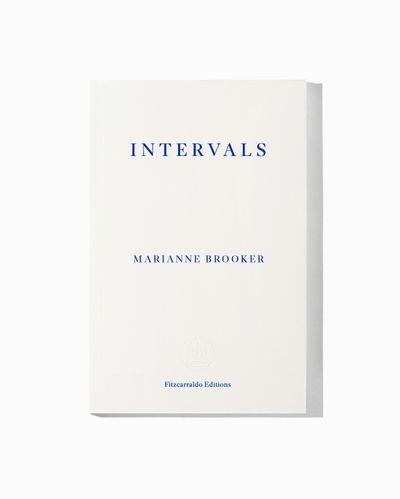
Intervals
Longlisted for the Women’s Prize for Non-Fiction 2024
French paperback with flaps, 200 pages
Published 28 February 2024
Intervals
¶ Becoming
Some books are old familiars; theirs is a faithful magic. My copy of The Velveteen Rabbit was a gift from my mum on 2 June 1993. She inscribed the date in a diagonal line across the top-left corner of the flyleaf as if it were significant, but I’m not sure why she gave it to me on that day – it’s not my birthday, though hers was a few days before. I would have been one and a half; she would have just turned twenty-four. Now, the book has been with me longer than anything and anyone else, there on a shelf in every house I’ve lived in. Nestled inside a mottled cream slip case, it has a blue cloth cover with the title embossed in gold; its watercolour illustrations are all sandy browns and midnight shadow.
To Marianne, the inscription reads, who made all the toys become real for me. ‘Real isn’t how you’re made,’ says the wise toy horse to the velveteen rabbit: ‘It’s a thing that happens to you … You become.’ Our realness isn’t just on our skin or in our bones, it’s a process, a relation. ‘Does it hurt?’ the rabbit questions, his curiosity tilting into fear. ‘Sometimes,’ comes the reply, always honest. ‘Generally, by the time you are Real, most of your hair has been loved off, and your eyes drop out and you get loose in the joints and very shabby.’ We love one another into being, long and close; love builds us up and wears us thin. ‘Once you are Real you can’t become unreal again. It lasts for always,’ the book promises.
But the sentiment doesn’t hold, at least not within the confines of the book. The toy rabbit, old and loved, is eventually thrown away by a nurse as she decontaminates the house following a bout of scarlet fever. Slumped in his sadness and disrepair, he’s visited by a fairy who explains that though the rabbit was once ‘Real to the Boy’, with whom he’d slept and played, he’ll now become ‘Real to everyone’. With this, they fly from the rubbish heap intothe woods, where ‘all the forest was beautiful, and the fronds of the bracken shone like frosted silver’. Released into being, the former toy is set free to leap and dance with the other rabbits.
Perhaps this arc is curative: the shabby rabbit is implicitly made better, gifted with autonomous movement and only glancingly familiar to the boy he’s left behind. Or perhaps it’s spiritual: the rabbit has died and the forest is a gentle heaven for the loved and lost, or grown-out-of. But there’s something else happening; it’s not just the rabbit that is transformed but the world around him. Unlike the nursery, where ‘expensive’, ‘modern’ and ‘technical’ toys intimidate those who are cheap and ‘commonplace’, the woodland borrows its texture and detail from the vel- veteen rabbit himself. Newly animated, he’s reflected in his surroundings: ‘at last, at last’ he cries, leaping across ‘velvet grass’. The world changes and becomes, just as he does.
The gift of the book might have been occasioned by moving house. A year or so after I was born, we swapped my grandparents’ spare room for a council flat on another side of town, in a neighbourhood that often smelled of soap, tucked away in the shadow of a looming Procter & Gamble factory. I remember that first home of our own being palatial, perhaps because I was small or perhaps because memory can render pleasure in square metres, expanding the space with the strength of feeling. Certainly, the flat itself must have been small, or just big enough. In a photograph taken there when I was four or so, I’m crouched on the patch of grass outside, hair in a ponytail and smiling straight at the camera. Ahead of my time, I’m wearing a black T-shirt, black jeans and tiny, flowery Dr. Martens – unquestionably my mother’s daughter.
The photograph is one of the few remnants of a trove of pictures that we stored in a wicker picnic basket on top of a wardrobe. I coveted the basket for years, quietly unbuckling its leather straps and sneaking photographs into my pocket for insertion into my own clandestine archive: my grandma, smiling in black and white, stuck to the wall above my bed; my father – whom I have never met – forced into the folds of a small, thick square and wedged into the gaps of a vent, just above the skirting board. Much to my mum’s annoyance, photos would turn up under the bed, slipped between book covers or Blu-Tacked to the walls: cut up, sequestered and scribbled over.
Not everything, however, can be hoarded like a book or a photograph. Some stories are myth, passed around like secrets with their own legendary time, all whispers and awe. I had a small circle of imaginary friends, some of my own making and some borrowed from the world (David Bowie chief among them). Every evening, my mum laid out two plates for dinner: one for me and one for Louis-Lou, my favourite made-up friend. She’d wait for me to finish and go to bed before eating the second, untouched plate. I don’t remember this, but she often told the story, proud of both her generosity and her fortitude. As adults we’d joke: ‘How hungry are you, and how about Louis-Lou?’
Once, we wrote a letter to E.T., another imaginary friend. To my surprise, soon after, I found a reply waiting on the doorstep. I’d only just learned how to read and knew instantly that his language of bright pink shapes and symbols wasn’t mine. Curious, we took the letter to our neighbour, the only person we knew with an Alien Translation Machine – or so my mum claimed. I watched as she summoned the message up on its screen, the hard drive gently whirring as it translated the otherworldly Wingdings into words. I lost the letter many years ago and don’t remember what it said, but I still wonder at it: the sheer invention, the shared belief.
These tales have a cumulative power: first a whim then a way of life; next a hope then a habit. Childhood fantasies buffer our coming into being and soften the edges between what’s real and what’s possible. Anyone can believe in something, stubborn and singular, but it’s a powerful thing to participate in someone else’s wish. Play engenders a politics of alliance, not transcending our material conditions (impossible), but transforming them, plate by plate, letter by letter, dream by dream. We carried our determined fantasies into adulthood: ‘Real isn’t how you’re made,’ my mum taught me, it’s what you make. ‘The critical promise of fantasy,’ Judith Butler writes, ‘is to challenge the contingent limits of what will and will not be called reality. Fantasy is what allows us to imagine ourselves and others otherwise … It points elsewhere, and when it is embodied, it brings the elsewhere home.’ Well-practised in this art, my mum welcomed in all that was strange and made the world her own. Whether one believes in this promise can depend on the largeness of the world already available. For a young working-class single mum, the world’s ‘contingent limits’ might well be found wanting. There has always been something at stake for us in imagining the world otherwise, a transformative power on which we’d often need to draw.
(…)
‘Intervals is an exceptional book, for which every deserved superlative seems cliched, in part because the language of illness, death and bereavement often feels too hollowed out by use to accommodate the magnitude of those experiences.… [W]ritten with such clarity and precision… this angry, loving, sorrowing and profound book is a magnificent starting point for [a] radical imaginative act.’
— Alex Clark, Observer
‘Brooker debuts with a searing meditation on end-of-life care that traces her mother’s primary progressive multiple sclerosis from her diagnosis in 2009 to her death 10 years later…. She also constructs an indelible portrait of her tenacious mother, who died after she voluntarily stopped eating and drinking. With breathtaking precision and piercing moral clarity, Brooker delivers a brilliant blend of memoir and cultural critique that’s likely to reshape readers’ ideas about death and dying.’
— Publisher’s Weekly, starred review
‘Intervals is an endlessly moving and profoundly generous telling of what it means to give and receive care. Stunning in its intimacy and expansive in its political purpose, Brooker’s writing invites us to think deeply about the relationship between giving care and honouring life. Through visceral, tactile details of creating, working, making and tending, Brooker brings us into the spaces where caring happens, where life and its endings happen. A rare, revelatory, and truly radical book.’
— Elinor Cleghorn, author of Unwell Women
‘In this compelling and beautifully written book Marianne Brooker anatomizes the rights of the dying and the failures of the state to support rather than penalize those living with disability. Intervals is simultaneously a memoir of individual experience and a powerful reflection on the nature of home, care, death and love that deserves to be read and heard by the widest possible audience.’
— Daisy Hay, author of Dinner with Joseph Johnson
‘I am now both mad and grateful for this formidable work of thought, which subtly yet profoundly shifts the terms of discussion on dying. What kind of world have we built for one another, asks Marianne Brooker, where many must struggle to be present for their own deaths? The many who live on borrowed time, in borrowed homes, dispossessed by a society that dangles rights without furnishing means? From nothing less than heartbreak, Brooker has germinated an exquisite and extraordinary reckoning, bringing a sorely needed focus on the substance of life to questions of a socially just death.’
— Amber Husain, author of Meat Love
‘I marvelled at Marianne Brooker’s Intervals. Out of her mother’s death, she weaves a short, tender, angry yet clear-eyed book about the nature of love, and what it requires of us all if we’re doing it right.’
— Joanna Biggs, author of A Life of One’s Own
‘Both an elegy and an account of interrupted time, in this generous book Marianne Brooker draws together threads of memoir, social history and literature to tell a lyrical, ethical, and above all political story of pain, care, and maternal connection. Deftly, movingly, Brooker reminds us of the interdependence at the heart of all our lives, that we inherit more than biological matter, and that the dying mourn the living, too.’
— Helen Charman, author of Mother State
‘Intervals is an extraordinary essay that is both unflinchingly intimate and radically political. It is the simple account of a daughter losing her mother too soon. It is also an examination of class, money and structural power. Brooker’s striking achievement is to never be prescriptive while, at the same time, never holding back from the force of her argument. It is, I suppose, an elegy. And like the best of elegies, and the bond it describes – it is charged with life.’
— Nathan Filer, author of The Shock of the Fall
‘A beautifully written portrayal of caring and end-of-life decisions – exquisitely sensitive, passionate and angry in its railing against our broken social care system.’
— Sam Mills, author of The Fragments of my Father
‘Brooker splices her lucid narrative with quotes from other writers, including Maggie Nelson, DW Winnicott, Annie Ernaux and Lola Olufemi, broadening her story from an account of what happened in a small, rented house in Devon to one that deserves to make everyone, everywhere, rethink end-of-life care…. [T]his is a brave, generous book that begs to be widely read. Brooker captures the messy reality of a difficult death with pathos and plenty of wry asides.’
— Susie Mesure, Prospect
‘Intervals is a philosophical rumination on the politics of death and dying. As she tracks her mother’s illness, Brooker unpacks the socio-economic environment she is dying in – austerity and cuts to welfare support, the surging costs of funerals, the lack of access to assisted dying. Situating her memoir in a political sphere, Brooker offers the reader a new or rarely discussed perspective on death as a socio-political issue, building on a body of evidence … which she knits together with her own narrative, in prose that is engaging yet lyrical.’
— Beatrice Tridimas, Review 31
Marianne Brooker is based in Bristol, where she works for a charity campaigning on climate and social justice. She has a PhD from Birkbeck and a background in arts research and teaching. She won the 2022 Fitzcarraldo Essay Prize for Intervals, her first book.

